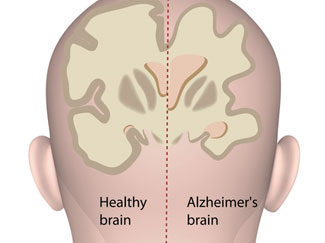Diagnosis of Alzheimer’s Disease
Alzheimer’s Disease diagnosis is achieved by ruling out other causes of similar symptoms

Find out if you are at risk - get tested
| Test Type | Testing Time | Fee |
| 4 to 6 weeks | $195 Click Here to Order Kit |
All orders received before 3pm PST / 6pm EST are shipped out the same business day. All orders received after 3pm PST / 6pm EST or on weekends or holidays are shipped out the following business day. 24/7 online status check and account management available for all tests.
Diagnosing Alzheimer’s Disease
Diagnosing Alzheimer’s disease is a difficult process. Doctors are able to diagnose a patient suffering from memory loss as either “possible Alzheimer’s dementia” or “probable Alzheimer’s dementia”. The “probable” diagnosis indicates that no other cause of dementia can be found, whereas the memory loss in a “possible” diagnosis may be due to other forms of dementia or other causes. Memory loss or thinking concerns can be due to other causes including stroke, tumor, sleep disturbances, medication side effects, infections, depression, thyroid disease and vitamin deficiencies. Therefore an early diagnosis is important, as many of these other causes are treatable. Currently a “definitive” diagnosis of Alzheimer’s disease can only be made post-mortem by a brain autopsy.
Late-Onset Alzheimer’s Disease Risk Factor APOE DNA Test
A buccal swab DNA test can identify which APOE alleles a person has. This allows for the identification of individuals who carry the APOE e4 allele and have an increased risk of developing Late-Onset Alzheimer’s disease. However, this also does not allow for a definitive diagnosis as it only indicates whether or not there is an increased risk.
Other tests
Diagnosis of Alzheimer’s includes several steps that may be repeated over time to establish changes in the patient’s cognitive functions. These diagnostic steps include obtaining a thorough understanding of the patient’s overall health, medical history, ability to carry out normal activities and any changes in personality and behavior. Standard medical tests (e.g. blood and urine analysis) and brain scans are conducted to rule out other possible causes of memory loss. Detailed tests of memory, problem solving, attention, counting and language are taken to analyze cognitive function. Neuroimaging is used to identify gross cerebral cortical atrophy and diffuse cerebral hypometabolism.
Next, Alzheimer’s Disease Treatment »
Recommended Links: Alzheimer’s Disease Fact Sheet. Alzheimer’s Disease Education and Referral (ADEAR) Center – A service of the National Institute on Aging, National Institutes of Health.
